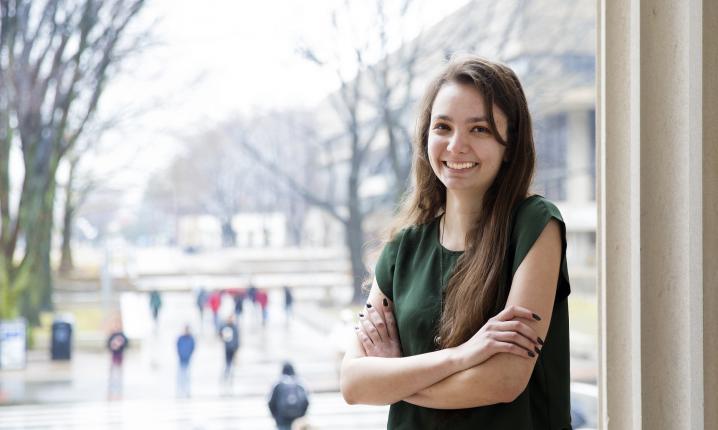Tchelet Segev loves walking down the Infinite Corridor, the tenth of a mile stretch of hallway connecting MIT’s main campus buildings. It is a chance to see friends and professors, and it has the quintessential active and engaged MIT vibe that she will miss after graduating this spring.
Segev has worked hard to support this sense of community, serving in leadership positions on numerous boards, committees, and student organizations. While completing both her BS and MEng in civil and environmental engineering in four years, Segev has acted as the chair of the Undergraduate Association (UA) Special Projects Committee, co-chair of the UA Student Support and Wellness Committee, and vice president of the Class Awareness Support and Equality (CASE) student organization.
As part of the UA and CASE, Segev helped to spearhead a survey that uncovered food insecurity on campus, and in response joined the Accessing Resources Coalition, a group of students and administrators working to connect low- and middle-income students to essential resources on and off campus.
She has also worked to support her fellow students one-on-one, serving as a member of the Peer Ears residence-based mental health support network for two years and acting as the group’s co-president her sophomore year. Students who participate in Peer Ears are trained by clinicians from MIT Medical’s Mental Health and Counseling Department to recognize classmates in distress, support others’ mental health, and help members of the MIT community feel cared about.
Segev has also served in an advisory capacity to the MindHandHeart initiative, a coalition of students, faculty, and staff working to make MIT a more welcoming, inclusive, and healthy place. She was recognized at the MIT Awards Convocation on May 10 for advancing community life at MIT and given the Laya Wiesner and William L. Stewart, Jr. Awards. CASE was also recognized with the Bridge Builder Group Award.
“I care about people, and that drives how I spend my academic and non-academic time,” Segev says. “It’s really important to me to do what I can to support those around me.”
During her time at MIT, Segev has seen a shift in students’ perception of mental health issues. “I think people are more and more comfortable talking about wellness and mental health topics, which are still a bit taboo, but having these conversations is really important to encourage help-seeking.”
One of Segev’s most rewarding activities has been founding Tea with Teachers with her friends Sina Booeshagi ’17, Nicholas Curtis, and Melissa Cao. Tea With Teachers is a weekly YouTube series where students interview faculty members about their lives outside of the classroom. Chancellor Cynthia Barnhart, Vice Chancellor Ian Waitz, and Institute Professor Robert Langer have all appeared on the series.
“I’ve had people tell me that they almost go and wave to a professor in the hall, then realize they don’t know who the professor is — they’ve only seen them on Tea with Teachers,” says Segev. “It’s just inspirational seeing faculty members in a new light. Not only are they superstars, but they’re also completely normal like me. They have interesting hobbies and foods they won’t eat — it makes professors seem more approachable.”
In the classroom and through her internships, Segev has coupled her drive to help other people with her passion for the natural environment. For her master’s thesis, she is working with the Center for Environmental Health Sciences and the Passamaquoddy, a Native American tribe, to analyze the water quality and associated health risks in a region of northeast Maine. As part of this project, Segev has led community meetings and worked with local residents to collect and test water samples.
She has also worked on environmental issues on an international scale, inspired by her peers in iHouse (International Development House), a residential community comprised of students with an interest in international development and service. She worked on a rainwater harvesting program in Mexico City and on a wastewater management project in India through MISTI India. Last summer, she participated in the MIT Washington Summer Internship Program and interned at the World Bank.
“One of the biggest problems we’re facing in the world right now is focusing on the short term instead of the long term,” Segev says. “This is impacting the environment in all political climates. We’re looking to short-term energy solutions and wreaking environmental havoc without considering the impact on future generations.”
Considering what can be done to address environmental degradation, Segev reflects, “Part of it is raising awareness and changing individual habits, but another part is having more scientists and engineers involved with policymaking.”
Segev aims to be a part of the solution to our current environmental crisis, and was recently chosen as a finalist for the Presidential Management Fellows program with the federal government, through which she aims to work as an environmental engineer in policy.
Continuing the compassionate and environmentally-minded work she began at MIT, Tchelet says of her future: “My dream is to become the first female UN Secretary General. I want to work on the world’s most pressing environmental challenges, while making sure the voices of local communities are heard in larger discussions.”



